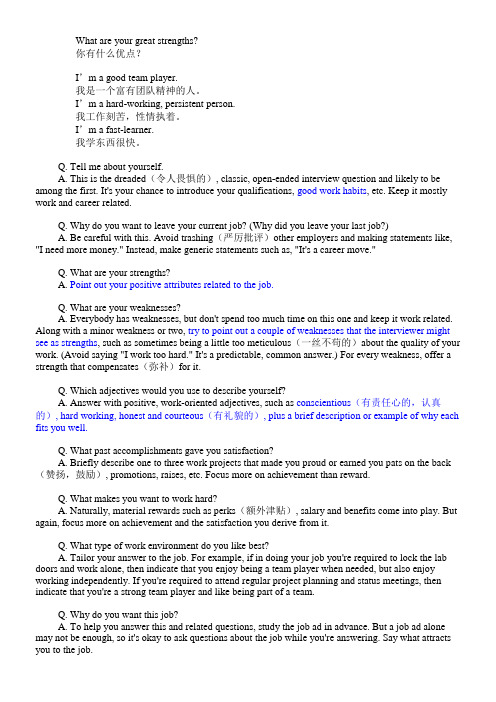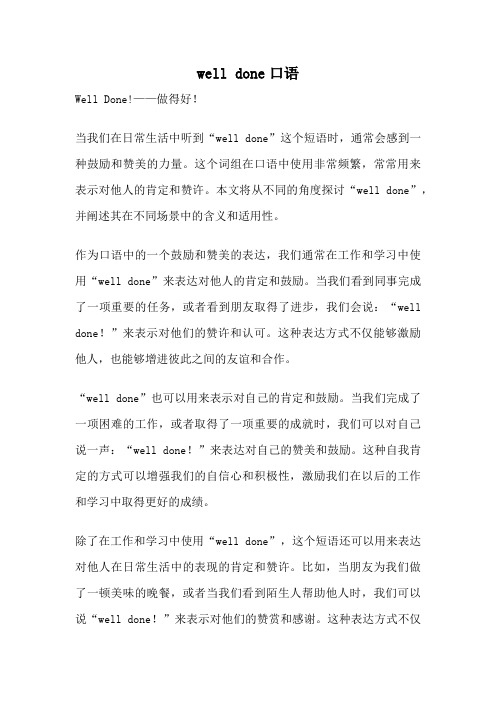Weld_Strength二个问个好
英语面试常见问题及回答

What are your great strengths?你有什么优点?I’m a good team player.我是一个富有团队精神的人。
I’m a hard-working, persistent person.我工作刻苦,性情执着。
I’m a fast-learner.我学东西很快。
Q. Tell me about yourself.A. This is the dreaded(令人畏惧的), classic, open-ended interview question and likely to be among the first. It's your chance to introduce your qualifications, good work habits, etc. Keep it mostly work and career related.Q. Why do you want to leave your current job? (Why did you leave your last job?)A. Be careful with this. Avoid trashing(严厉批评)other employers and making statements like, "I need more money." Instead, make generic statements such as, "It's a career move."Q. What are your strengths?A. Point out your positive attributes related to the job.Q. What are your weaknesses?A. Everybody has weaknesses, but don't spend too much time on this one and keep it work related. Along with a minor weakness or two, try to point out a couple of weaknesses that the interviewer might see as strengths, such as sometimes being a little too meticulous(一丝不苟的)about the quality of your work. (Avoid saying "I work too hard." It's a predictable, common answer.) For every weakness, offer a strength that compensates(弥补)for it.Q. Which adjectives would you use to describe yourself?A. Answer with positive, work-oriented adjectives, such as conscientious(有责任心的,认真的), hard working, honest and courteous(有礼貌的), plus a brief description or example of why each fits you well.Q. What past accomplishments gave you satisfaction?A. Briefly describe one to three work projects that made you proud or earned you pats on the back (赞扬,鼓励), promotions, raises, etc. Focus more on achievement than reward.Q. What makes you want to work hard?A. Naturally, material rewards such as perks(额外津贴), salary and benefits come into play. But again, focus more on achievement and the satisfaction you derive from it.Q. What type of work environment do you like best?A. Tailor your answer to the job. For example, if in doing your job you're required to lock the lab doors and work alone, then indicate that you enjoy being a team player when needed, but also enjoy working independently. If you're required to attend regular project planning and status meetings, then indicate that you're a strong team player and like being part of a team.Q. Why do you want this job?A. To help you answer this and related questions, study the job ad in advance. But a job ad alone may not be enough, so it's okay to ask questions about the job while you're answering. Say what attracts you to the job.Q. How do you handle pressure and stress?A. This is sort of a double whammy(剧烈的打击), because you're likely already stressed from the interview and the interviewer can see if you're handling it well or not. Everybody feels stress, but the degree varies. Saying that you whine(抱怨)to your shrink, kick your dog or slam down(往下放)a fifth of Jack Daniels are not good answers. Exercising, relaxing with a good book, socializing with friends or turning stress into productive energy are more along the lines of the "correct" answers.Q. Explain how you overcame a major obstacle.A. The interviewer is likely looking for a particular example of your problem-solving skills and the pride you show for solving it.Q. Where do you see yourself five (ten or fifteen) years from now?A. Explain your career-advancement goals that are in line with the job for which you are interviewing. Your interviewer is likely more interested in how he, she or the company will benefit from you achieving your goals than what you'll get from it, but it goes hand in hand to a large degree. It's not a good idea to tell your potential new boss that you'll be going after his or her job, but it's okay to mention that you'd like to earn a senior or management position.Q. What qualifies you for this job?A. Tout(兜售)your skills, experience, education and other qualifications, especially those that match the job description well. Avoid just regurgitating(全盘照搬)your resume. Explain why.Q. Why did you choose your college major?A. The interviewer is likely fishing(很想得到)to see if you are interested in your field of work or just doing a job to get paid. Explain why you like it. Besides your personal interests, include some rock-solid business reasons that show you have vision and business sense.Q: Can you sell yourself in two minutes? Go for it. (你能在两分钟內自我推荐吗?大胆试试吧!)A: With my qualifications and experience, I feel I am hardworking, responsible and diligent in any project I undertake. Your organization could benefit from my analytical and interpersonal skills. (依我的资格和经验,我觉得我对所从事的每一个项目都很努力、负责、勤勉。
well done口语

well done口语Well Done!——做得好!当我们在日常生活中听到“well done”这个短语时,通常会感到一种鼓励和赞美的力量。
这个词组在口语中使用非常频繁,常常用来表示对他人的肯定和赞许。
本文将从不同的角度探讨“well done”,并阐述其在不同场景中的含义和适用性。
作为口语中的一个鼓励和赞美的表达,我们通常在工作和学习中使用“well done”来表达对他人的肯定和鼓励。
当我们看到同事完成了一项重要的任务,或者看到朋友取得了进步,我们会说:“well done!”来表示对他们的赞许和认可。
这种表达方式不仅能够激励他人,也能够增进彼此之间的友谊和合作。
“well done”也可以用来表示对自己的肯定和鼓励。
当我们完成了一项困难的工作,或者取得了一项重要的成就时,我们可以对自己说一声:“well done!”来表达对自己的赞美和鼓励。
这种自我肯定的方式可以增强我们的自信心和积极性,激励我们在以后的工作和学习中取得更好的成绩。
除了在工作和学习中使用“well done”,这个短语还可以用来表达对他人在日常生活中的表现的肯定和赞许。
比如,当朋友为我们做了一顿美味的晚餐,或者当我们看到陌生人帮助他人时,我们可以说“well done!”来表示对他们的赞赏和感谢。
这种表达方式不仅能够让他人感受到我们的善意和友善,也能够促进社会的和谐与进步。
“well done”还可以用来表示对他人在体育比赛或竞赛中的出色表现的肯定和赞美。
当我们看到运动员在比赛中取得好成绩,或者看到选手在竞赛中展现出优异的才能时,我们可以用“well done!”来表达对他们的赞许和鼓励。
这种肯定和赞美不仅能够激励运动员和选手取得更好的成绩,也能够激发更多人参与体育运动和竞赛,推动体育事业的发展。
“well done”这个短语在口语中的使用非常广泛,几乎可以用在任何场合和情境中,用来表示对他人或自己的肯定和鼓励。
无论是在工作、学习、生活还是体育竞赛中,我们都可以用“well done!”来表达对他人或自己的赞许和赞美。
good与well的用法 -回复

good与well的用法-回复好的(good)与好地(well)是英语中常用的两个词汇,它们的用法是令人畏首畏尾的。
首先,我们来看一下好的(good)这个词的用法。
好的(good)是一个形容词,常用来描述事物或人的品质、状态或行为等。
例如,当我们谈论一个物品的品质很高时,可以说"这件衣服的质量很好"(The quality of this clothing is good)。
在这个例子中,"good"用来描述物品的品质。
除了用来描述事物的品质外,"good"还可以用来描述人的品质和特征。
比如,当我们说某个人很友好时,可以说"He is a good person"。
这里的"good"描述了这个人的友善品质。
此外,"good"还可以用来表示满意或赞扬。
例如,当我们喜欢或赞同某个建议或主意时,可以说"That's a good idea"。
在这个例子中,"good"表示我们对这个主意的认可和赞扬。
另一方面,我们来看一下好地(well)这个词的用法。
好地(well)是一个副词,用来描述动作、方式或状态的好或充分。
例如,当我们谈论某人做某件事情的方式很好时,可以说"He speaks English well"。
在这个例子中,"well"描述了这个人讲英语的方式。
此外,"well"还可以用来描述某人的健康状况或情绪状态。
比如,当我们问某人是否感觉良好时,可以说"How are you feeling? Are you well?"。
在这个例子中,"well"描述了某人的健康状态。
另一个常见的用法是在问候中使用"well"。
更快更强更高更团结的英文

更快更强更高更团结的英文“更快、更强、更高、更团结”的英文表述为:Faster, Higher, Stronger - Together。
以下是相关内容:英语释义:- Faster: moving or capable of moving at greater speed.- Higher: at or to a greater height or level.- Stronger: having more physical power or strength.- Together: in or into a single group, mass, or place; unitedly.短语:- strive for faster higher stronger 追求更快更高更强单词:- fast /fæst/ 快的- high /haɪ/ 高的- strong /strɔːŋ/ 强壮的- unity /ˈjuːnəti/ 团结用法:- We aim to be faster and stronger. 我们旨在变得更快更强。
- They are working together to reach higher goals. 他们正一起努力去达到更高目标。
双语例句:1. The athletes are constantly striving to be faster, higher, and stronger. 运动员们不断努力追求更快、更高、更强。
2. The spirit of "faster, higher, stronger - together" inspires us all. “更快、更高、更强 - 更团结”的精神激励着我们所有人。
3. Only by working together can we achieve faster progress and be stronger. 只有通过共同努力,我们才能取得更快的进步并变得更强。
good与well的用法区别口诀

good与well的用法区别口诀用法区别:好是一般形容词, good指人、物、事或环境等,形容词; well指“健康”、“道德”、“精神状态”、“肉体状况”等,名词。
1。
使用对象不同: good指“某人做得很好”、“好主意”、“好办法”等; well指“健康、有活力、心情好”等;还可表示“(指人)道德上的改善、身体的强壮、精神上的振奋”等,词义较wide。
2。
常与how、 when连用, well可以置于句首, good不能。
3。
常与一些动词或动词短语连用。
4。
单独使用时, well指“健康”、“道德”、“精神状态”、“肉体状况”等,词义较narrow。
5。
在非正式语言中,常把well用于否定句, good用于肯定句。
用法区别:好是指个人的品质、作风、水平、能力等; well指“健康、有活力、心情好”等。
两者都有使人或事物变得好的意思。
1。
用法不同: good:常用于肯定句,表示赞扬。
如: It was good to go there。
该结果是个好的选择。
How can we get along?这样相处怎么能行呢?用于肯定句中也可以,常用于否定句中,表示反问。
如: Don’ t you think that’ s a good idea?你难道认为这是个好主意吗?1。
在用法上区别:好和well不仅用于口语中,在书面语中也经常出现,例如, Good Morning,Sir,and you? Good morning,先生,您好。
2。
感情色彩不同: good,比较友好地,多用于上级对下级,长辈对晚辈。
如: You can do it yourself。
你自己去做吧。
而well,比较郑重地,多用于他人之间,表示商量,请求等场合。
如: You may take it on yourself。
你自己看着办吧。
3。
侧重点不同: good多用于有积极意义的, positive意义,如“做得好”、“做得对”; well 用于有negative意义, negative意义,如“坏”、“臭”、“坏蛋”、“坏事”。
strength的用法和搭配

strength的用法和搭配Strength的用法和搭配Strength这个词啊,可真是个挺有趣的家伙呢!它在英语里的用法那叫一个多种多样,搭配起来也是千变万化。
先来说说strength作为名词的时候吧。
最基本的意思呢,就是“力量”“力气”。
就像我那哥们儿小明,他天天去健身房锻炼,那他的strength可真是不得了啊!有一次,我们几个一起搬一个超级重的箱子,大家都累得气喘吁吁的,就他呀,轻轻松松就把箱子给抬起来了,还笑着说:“你们这是缺乏strength啊!”这时候的strength,就是指身体上的力量。
那在生活里,我们还经常说“内在的力量”,这个时候,strength就有点像一种精神的支撑了。
比如说小红,她家里遇到了很多困难,但是她一直都很坚强。
她跟我说:“我从自己的内心找到了strength,我知道我不能被这些困难打倒。
”你看,这里的strength就不是那种能举起多重东西的力气了,而是一种让人坚持下去的精神力量,就像黑暗中的一盏明灯,照亮着她前行的路。
那在表达“优势”“长处”的时候,strength也很常用哦。
比如说小李是个很聪明的家伙,他数学特别好。
他去面试一份工作的时候,面试官问他:“你觉得你能胜任这份工作的strength是什么?”小李就特别自信地说:“我的数学能力就是我的strength,我能快速准确地处理各种数据。
”这就好比在一场比赛里,你的某个技能特别厉害,那这个技能就是你的strength,是你能脱颖而出的资本。
现在咱们再来聊聊strength的搭配吧。
“physical strength”,这是很直接的搭配啦,就是“体力”的意思。
你看那些运动员,他们为了提高自己的physical strength,每天都要进行艰苦的训练。
就像那些长跑运动员,他们在训练的时候,那可是把自己的physical strength一点点地逼到极限呢。
还有“mental strength”,也就是“精神力量”。
stronger歌词翻译
stronger歌词翻译曲:Daft Punk, Pharrell Williams, Guy-Manuel de Homem-Christo& Thomas Bangalter 词:Daft Punk, Pharrell Williams, Guy-Manuel de Homem-Christo& Thomas Bangalter强大[Verse 1] 工作得太辛苦,让我变得更强大我需要更多的时间去治愈我的心灵当我感到疲倦时,我就坚持不懈我只是把愤怒变成了动力[Pre-Chorus] 想要更快、更好、更强大我需要努力,付出更多的汗水我不停地追寻这个梦想我要变得更强大[Chorus] 我变得更强大我变得更强大那些打倒我的东西只是使我变得更强大我变得更强大我变得更强大那些打倒我的东西只是使我变得更强大[Verse 2] 别想阻止我,我已经决定了没有任何东西能阻挡我前进的步伐在黑暗中慢慢摸索着前进我已经找到了力量[Pre-Chorus] 想要更快、更好、更强大我需要努力,付出更多的汗水我不停地追寻这个梦想我要变得更强大[Chorus] 我变得更强大我变得更强大那些打倒我的东西只是使我变得更强大我变得更强大我变得更强大那些打倒我的东西只是使我变得更强大[Bridge] 我变得更强大我变得更强大那些打倒我的东西只是使我变得更强大我变得更强大我变得更强大那些打倒我的东西只是使我变得更强大[Chorus] 我变得更强大我变得更强大那些打倒我的东西只是使我变得更强大我变得更强大我变得更强大那些打倒我的东西只是使我变得更强大这首歌《Stronger》由Daft Punk、Pharrell Williams、Guy-Manuel de Homem-Christo和Thomas Bangalter共同创作。
该歌曲以其强烈的旋律和励志的歌词而著称。
歌词中传达了一个宏大的主题:战胜逆境,变得更强大。
在工作中遇到困难时,人们往往会变得疲倦并感到无力。
strength 翻译
strength 翻译
Strength(力量)翻译
Strength是一个常用的英文单词,它在不同的语境中有不同的意思。
一般来说,strength通常指的是体力、力量和能力的总和。
它也可以指物理力量,也可以指心理力量和情感力量。
首先,从物理上来说,strength指的是一个人或者事物的力量,这些力量可以用来做某些工作或者抵抗外界的压力。
例如,一个人的体力是他的力量的表现,他能够承受外界的压力,而且也能够完成一些繁重的体力劳动。
此外,物体的强度也可以衡量它的力量,它能够承受外界压力,并且不会出现断裂、破裂或者变形。
其次,从心理学的角度来看,strength指的是一个人的内心力量,就是一个人的毅力和毅力,这种力量可以帮助一个人克服困难,追求梦想,不被外界的压力所打击。
例如,在一个人面对困难时,他能够坚持不懈,不断地前进,这就是他的内心力量。
另外,也可以从心理学的角度来看,strength指的是一个人的情感力量,就是一个人的忍耐力、宽容力、勇气等等,这种力量可以帮助一个人避免受到伤害,更好地处理自己的情绪,从而获得幸福和快乐。
最后,总之,strength可以指一个人或者事物的力量,它可以是物理力量,也可以是心理力量和情感力量。
它可以帮助一个人更好地应对外界的压力,克服困难,追求梦想,实现理想,获得幸福和快乐。
strength的中文是什么意思
strength的中文是什么意思strength的中文意思英 [streŋθ]美 [strɛŋkθ, strɛŋθ, strɛnθ]第三人称复数:strengths名词力量; 优点,长处; (光、声、色等的)力度; 人力[数]相关例句名词1. The enemy were in strength.敌人的兵力很大。
2. He hasn't got enough strength to remove that stone.他没有足够的力气搬走那块石头。
3. What is your strength?你们一共有多少人?4. I did it on the strength of your promise .我照着你的诺言而做此事的。
5. The medicine has lost its strength.这药已经失效。
strength的单语例句1. Both appear to be going from strength to strength as domestic business also grows dramatically along with the buying power of the two peoples.2. Naming a Cabinet in Japan has traditionally involved acareful balancing act, giving each of the party's main factionspositions that reflect their relative strength.3. Brown's cabinet reshuffle is viewed as a desperate move to regain voters'confidence and his authority and strength in the government.4. Apple earlier blamed the reception problem on a wrong method to calculate signal strength, and promised to fix the glitch with software updates.5. Under the threat of SARS, the Chinese people also displayed unusual calmness and strength.6. Jenkins said in his statement he was gaining strength daily and hoped soon to be healthy enough to leave the hospital for Camp Zama.7. Organizers said the campaign is part of the country's human resources development strategy, and is vital for upgrading China's competitiveness and national strength.8. It was expected to drop below tropical storm strength - 39 mph - before midnight, and was to drift into Canada later Sunday or early Monday.strength的词典解释1. 体力;力气;力量Your strength is the physical energy that you have, which gives you the ability to perform various actions, such as lifting or moving things.e.g. She has always been encouraged to swim to build up the strength of her muscles...一直有人鼓励她去游泳以强健体魄。
strength的用法总结大全
strength的用法总结大全想知道strength的用法吗?今日我给大家带来了strength的用法,盼望能够关心到大家,下面我就和大家共享,来观赏一下吧。
strength的用法总结大全strength的意思n. 力气,优点,特长,(光、声、色等的)力度,人力[数]strength用法strength可以用作名词strength的基本意思是“力”,可指详细人的“力气”或“体力”,也可指抽象的“精力”“意志力”“经济实力”等,还可指“人力,兵力”。
strength还可作“强度,浓度”“强点,特长”等解,作“强点,特长”解时,常与介词of连用。
at full strength的意思是“未稀释的,定额”; go from strength to strength的意思是“不断壮大”; in strength的意思是“大量地”; on the strength的意思是“在编”; on the strength of的意思是“基于,依据,靠着”。
strength用作名词的用法例句I have hardly enough strength left to move my feet.我连移动双脚的力气都几乎没有了。
In this game, you need more science than strength.在这项竞赛中,技巧比力气更重要。
By doing so, you can test the strength of steel.这样做,你可以试验一下钢的强度。
strength用法例句1、The turning point in the process of growing up is when you discover the core of strength within you that survives all hurt.当你从内心深处找到一种可以忍受一切苦痛的顽强力气时,你的成长历程就会消失飞跃。
